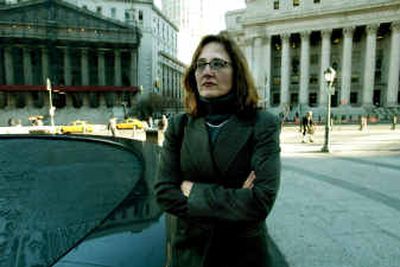Airport search guidelines modified for female fliers

WASHINGTON – Airport security screeners this week will be instructed not to touch women passengers between their breasts as part of new pat-down procedures, the Transportation Security Administration said Wednesday.
The agency said it is making a modification to its searching methods that began in September after more than 400 passengers – mostly women – formally complained that the experience was invasive, humiliating and akin to being molested.
Screeners had been instructed to use their hands to touch women between and underneath their breasts to inspect for explosives that might be hidden beneath clothing.
Now, the agency said, security screeners will be directed to pat down only the “chest perimeter” of female passengers and not to touch women between their breasts unless they set off a hand-held metal detector in the chest area. Female screeners perform the procedure on female passengers.
Mark Hatfield, a TSA spokesman, said officials changed the procedure to respond to passengers who have complained. Screeners, who number more than 45,000, will continue to conduct routine pat-downs on passengers because the agency remains concerned that the nation’s air system is vulnerable to terrorists who smuggle explosives onto airplanes by hiding them on their bodies. Such methods are believed to be the cause of what brought down two Russian airliners in August.
“We can still get at the threat with this modified pat-down procedure,” Hatfield said.
Already, Hatfield said, the TSA has tried to respond to women’s concerns about being patted down. Earlier this month, the agency instructed screeners to allow passengers to put their arms down after being screened with the hand-held metal detector so that they would not feel they are assuming a stance like that of a criminal.
About 15 percent of airline passengers, or 2 million a week, are selected for the pat-down searches if they trigger the walk-through magnetometer, if they are selected by a computer screening system, or if a security screener decides the passenger’s clothing or shoes meet a certain “profile” or appear suspicious.
A.J. Castilla, a TSA screener in Boston, said he and other screeners wrote a letter to top officials that proposed an alternative to pat-down searches using the same explosive-detection technology used to screen carry-on luggage. He said he received a form letter back.
“The pat-down policy cannot replace technology that can do the job more safely,” Castilla said. “It’s already in every airport.”
TSA officials said they are testing a system at airports that involves touching a cotton swab on a bag and then placing the swab in a machine that reads for explosives residue. But trying to adapt that system for use on people’s clothing and skin has not been successful, officials said.
The TSA’s change comes as the American Civil Liberties Union said Wednesday it will begin collecting information from passengers with complaints about the pat-downs on its Web site, www.aclu.org. It’s considering litigation against the TSA over what it calls “aggressive” searches.
The latest modification does not get to the root of the problem, said Barry Steinhardt, director of the ACLU’s technology and liberty program. “The core issue is, is this justified?” he said. It’s not just a few people who are being targeted. “Now, we’re talking about middle-class American women,” he said.
More than 40 passengers, all of whom are women, have complained to the ACLU.
Patricia Sturm of Staten Island, N.Y., already contacted the ACLU after an October incident in which she said a security screener touched her breasts and crotch area in a way that made her feel “defiled.”
“I don’t want to be groped, I don’t want to be fondled, I don’t want to be made to feel like a criminal because I bought an airline ticket,” Sturm said. “How is checking my breasts every week going to keep the nation safe?”